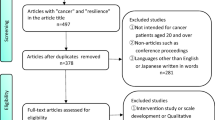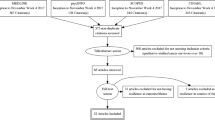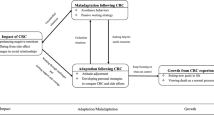Abstract
Background
Resilience was correlated with psychological outcomes and quality of life in lung cancer patients. But the resilience process and its protective factors remained uncertain.
Purpose
To investigate and analyze resilience process and its protective factors in long-term survivors after lung cancer surgery.
Methods
This qualitative study included 19 patients who had survived at least 5 years after lung cancer surgery. Colaizzi’s method of phenomenology was used for data analysis.
Results
Analysis of this study was divided into the resilience process and protective factors. The resilience process was summarized into three stages, including initial stress, adaptation to disease, and personal growth. Five themes were regarded contributing to their own resilience in this process, including excellent psychological qualities, good social support, regular lifestyle and exercise, participating in social activities, and Chinese medicine.
Conclusion
This study showed the dynamic process of resilience and its protective factors in long-term survivors after lung cancer surgery. Future studies could identify average length of time of each stage and how patients transfer between stages during resilience process. Besides, interventions could be carried out to educate patients diagnosed with cancer about normal stages of change in body and resilience through time and strategies on adaptation and adjustment of lung cancer.

Similar content being viewed by others
References
Bray F, Ferlay J, Soerjomataram I, Siegel RL, Torre LA, Jemal A (2018) Global cancer statistics 2018: GLOBOCAN estimates of incidence and mortality worldwide for 36 cancers in 185 countries. CA Cancer J Clin 68(6):394–424. https://doi.org/10.3322/caac.21492
Yang Z, Zheng R, Zhang S, Zeng H, Xia C, Li H, Wang L, Wang Y, Chen W (2017) Comparison of cancer incidence and mortality in three GDP per capita levels in China, 2013. Chin J Cancer Res 29(5):385–394. https://doi.org/10.21147/j.issn.1000-9604.2017.05.02
Miller KD, Siegel RL, Lin CC, Mariotto AB, Kramer JL, Rowland JH, Stein KD, Alteri R, Jemal A (2016) Cancer treatment and survivorship statistics, 2016. CA Cancer J Clin 66(4):271–289. https://doi.org/10.3322/caac.21349
Choi S, Ryu E (2018) Effects of symptom clusters and depression on the quality of life in patients with advanced lung cancer. Eur J Cancer Care (Engl) 27(1):e12508. https://doi.org/10.1111/ecc.12508
Casellas-Grau A, Vives J, Font A, Ochoa C (2016) Positive psychological functioning in breast cancer: an integrative review. Breast 27:136–168. https://doi.org/10.1016/j.breast.2016.04.001
Chida Y, Steptoe A (2008) Positive psychological well-being and mortality: a quantitative review of prospective observational studies. Psychosom Med 70(7):741–756. https://doi.org/10.1097/PSY.0b013e31818105ba
APA (2020) Building your resilience. http://www.apa.org/topics/resilience. Accessed May 24 2020
Seiler A, Jenewein J (2019) Resilience in cancer patients. Front Psychiatry 10:208–208. https://doi.org/10.3389/fpsyt.2019.00208
Stainton A, Chisholm K, Kaiser N, Rosen M, Upthegrove R, Ruhrmann S, Wood SJ (2019) Resilience as a multimodal dynamic process. Early Interv Psychiatry 13(4):725–732. https://doi.org/10.1111/eip.12726
Eicher M, Matzka M, Dubey C, White K (2015) Resilience in adult cancer care: an integrative literature review. Oncol Nurs Forum 42(1):E3–E16. https://doi.org/10.1188/15.ONF.E3-E16
Kumpfer KL (2002) Factors and processes contributing to resilience. In: Glantz MD, Johnson JL (eds) Resilience and development: positive life adaptations. Springer US, Boston, pp 179–224. https://doi.org/10.1007/0-306-47167-1_9
Ye ZJ, Peng CH, Zhang HW, Liang MZ, Zhao JJ, Sun Z, Hu GY, Yu YL (2018) A biopsychosocial model of resilience for breast cancer: a preliminary study in mainland China. Eur J Oncol Nurs 36:95–102. https://doi.org/10.1016/j.ejon.2018.08.001
Deshields TL, Heiland MF, Kracen AC, Dua P (2016) Resilience in adults with cancer: development of a conceptual model. Psychooncology 25(1):11–18. https://doi.org/10.1002/pon.3800
Hu T, Xiao J, Peng J, Kuang X, He B (2018) Relationship between resilience, social support as well as anxiety/depression of lung cancer patients: a cross-sectional observation study. J Cancer Res Ther 14(1):72–77. https://doi.org/10.4103/jcrt.JCRT_849_17
Lee JL, Jeong Y (2019) Quality of life in patients with non-small cell lung cancer: structural equation modeling. Cancer Nurs 42(6):475–483. https://doi.org/10.1097/NCC.0000000000000645
Ye ZJ, Qiu HZ, Li PF, Liang MZ, Zhu YF, Zeng Z, Hu GY, Wang SN, Quan XM (2017) Predicting changes in quality of life and emotional distress in Chinese patients with lung, gastric, and colon-rectal cancer diagnoses: the role of psychological resilience. Psychooncology 26(6):829–835. https://doi.org/10.1002/pon.4237
Korstjens I, Moser A (2017) Series: practical guidance to qualitative research. Part 2: context, research questions and designs. Eur J Gen Pract 23(1):274–279. https://doi.org/10.1080/13814788.2017.1375090
Ran J, Wang J, Bi N, Jiang W, Zhou Z, Hui Z, Liang J, Feng Q, Wang L (2017) Health-related quality of life in long-term survivors of unresectable locally advanced non-small cell lung cancer. Radiat Oncol (London, England) 12(1):195. https://doi.org/10.1186/s13014-017-0909-6
Abdel-Rahman O (2017) Causes of death in long-term lung cancer survivors: a SEER database analysis. Curr Med Res Opin 33(7):1343–1348. https://doi.org/10.1080/03007995.2017.1322052
Foley KL, Farmer DF, Petronis VM, Smith RG, McGraw S, Smith K, Carver CS, Avis N (2006) A qualitative exploration of the cancer experience among long-term survivors: comparisons by cancer type, ethnicity, gender, and age. Psychooncology 15(3):248–258. https://doi.org/10.1002/pon.942
Moser A, Korstjens I (2018) Series: practical guidance to qualitative research. Part 3: Sampling, data collection and analysis. Eur J Gen Pract 24(1):9–18. https://doi.org/10.1080/13814788.2017.1375091
Edward KL, Welch T (2011) The extension of Colaizzi’s method of phenomenological enquiry. Contemp Nurse 39(2):163–171. https://doi.org/10.5172/conu.2011.163
Colaizzi PF (1978) Psychological research as the phenomenologist views it. pp 48–71
Lee V (2008) The existential plight of cancer: meaning making as a concrete approach to the intangible search for meaning. Support Care Cancer 16(7):779–785. https://doi.org/10.1007/s00520-007-0396-7
Kernan WD (1982) Lepore SJ (2009) Searching for and making meaning after breast cancer: prevalence, patterns, and negative affect. Soc Sci Med 68(6):1176–1182. https://doi.org/10.1016/j.socscimed.2008.12.038
Tomich PL, Helgeson VS (2002) Five years later: a cross-sectional comparison of breast cancer survivors with healthy women. Psychooncology 11(2):154–169. https://doi.org/10.1002/pon.570
Ye ZJ, Qiu HZ, Liang MZ, Liu ML, Li PF, Chen P, Sun Z, Yu YL, Wang SN, Zhang Z, Liao KL, Peng CF, Huang H, Hu GY, Zhu YF, Zeng Z, Hu Q, Zhao JJ (2017) Effect of a mentor-based, supportive-expressive program, Be Resilient to Breast Cancer, on survival in metastatic breast cancer: a randomised, controlled intervention trial. Br J Cancer 117(10):1486–1494. https://doi.org/10.1038/bjc.2017.325
Rosenberg AR, Bradford MC, McCauley E, Curtis JR, Wolfe J, Baker KS, Yi-Frazier JP (2018) Promoting resilience in adolescents and young adults with cancer: results from the PRISM randomized controlled trial. Cancer 124(19):3909–3917. https://doi.org/10.1002/cncr.31666
Tedeschi RG, Calhoun LG (1996) The Posttraumatic Growth Inventory: measuring the positive legacy of trauma. J Trauma Stress 9(3):455–471. https://doi.org/10.1007/bf02103658
Costa ALS, Heitkemper MM, Alencar GP, Damiani LP, Silva RM, Jarrett ME (2017) Social support is a predictor of lower stress and higher quality of life and resilience in Brazilian patients with colorectal cancer. Cancer Nurs 40(5):352–360. https://doi.org/10.1097/ncc.0000000000000388
Stewart DE, Yuen T (2011) A systematic review of resilience in the physically ill. Psychosomatics 52(3):199–209. https://doi.org/10.1016/j.psym.2011.01.036
Liao YH, Li CI, Lin CC, Lin JG, Chiang JH, Li TC (2017) Traditional Chinese medicine as adjunctive therapy improves the long-term survival of lung cancer patients. J Cancer Res Clin Oncol 143(12):2425–2435. https://doi.org/10.1007/s00432-017-2491-6
Borregaard B, Ludvigsen MS (2018) Exchanging narratives-a qualitative study of peer support among surgical lung cancer patients. J Clin Nurs 27(1-2):328–336. https://doi.org/10.1111/jocn.13903
Acknowledgments
We thank all of the researchers and participants in this study. We also thank Audrey Holmes, MA, from Liwen Bianji, Edanz Group China (www.liwenbianji.cn/ac), for editing the English text of a draft of this manuscript.
Author information
Authors and Affiliations
Corresponding author
Ethics declarations
The ethics committee of the Second Xiangya Hospital, Central South University, approved our study (Approval Number: 2019038). All participants gave informed consent before their inclusion in the study.
Additional information
Publisher’s note
Springer Nature remains neutral with regard to jurisdictional claims in published maps and institutional affiliations.
Rights and permissions
About this article
Cite this article
Li, X., Chen, S., Zhang, J. et al. Resilience process and its protective factors in long-term survivors after lung cancer surgery: a qualitative study. Support Care Cancer 29, 1455–1463 (2021). https://doi.org/10.1007/s00520-020-05633-4
Received:
Accepted:
Published:
Issue Date:
DOI: https://doi.org/10.1007/s00520-020-05633-4




